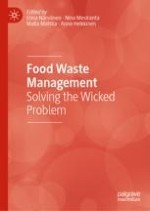2020 | OriginalPaper | Buchkapitel
5. The Evolution of the German Anti-food Waste Movement: Turning Sustainable Ideas into Business
verfasst von : Johanna F. Gollnhofer, Daniel Boller
Erschienen in: Food Waste Management
Aktivieren Sie unsere intelligente Suche, um passende Fachinhalte oder Patente zu finden.
Wählen Sie Textabschnitte aus um mit Künstlicher Intelligenz passenden Patente zu finden. powered by
Markieren Sie Textabschnitte, um KI-gestützt weitere passende Inhalte zu finden. powered by
